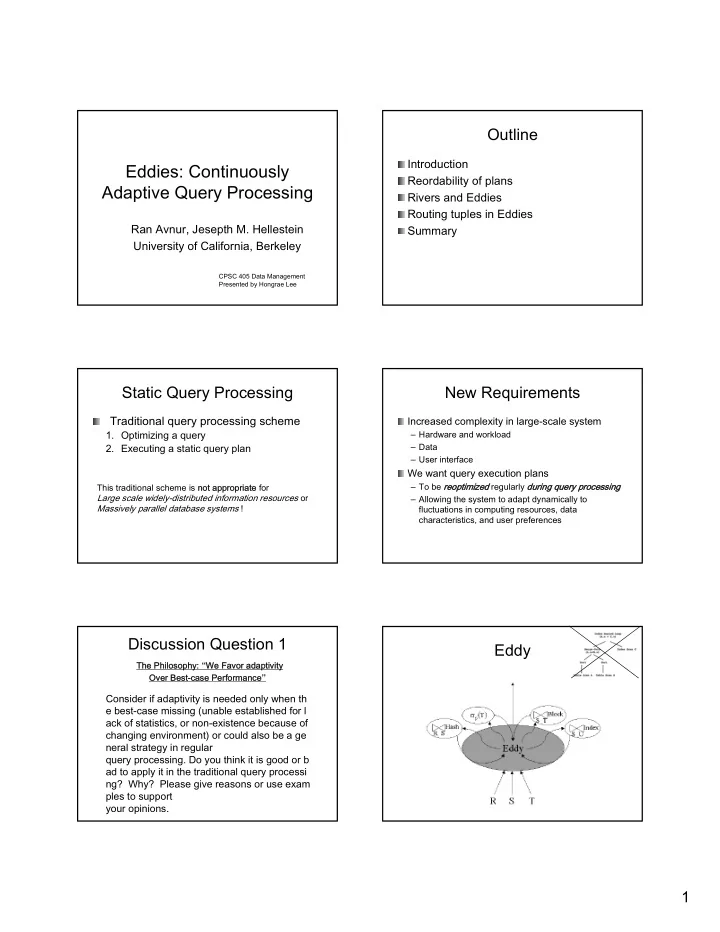

Outline Introduction Eddies: Continuously Reordability of plans Adaptive Query Processing Rivers and Eddies Routing tuples in Eddies Ran Avnur, Jesepth M. Hellestein Summary University of California, Berkeley CPSC 405 Data Management Presented by Hongrae Lee Static Query Processing New Requirements Traditional query processing scheme Increased complexity in large-scale system 1. Optimizing a query – Hardware and workload – Data 2. Executing a static query plan – User interface We want query execution plans – To be reoptimized regularly during query processing This traditional scheme is not appropriate for Large scale widely-distributed information resources or – Allowing the system to adapt dynamically to Massively parallel database systems ! fluctuations in computing resources, data characteristics, and user preferences Discussion Question 1 Eddy The Philosophy: “ We Favor adaptivity Over Best-case Performance ” Consider if adaptivity is needed only when th e best-case missing (unable established for l ack of statistics, or non-existence because of changing environment) or could also be a ge neral strategy in regular query processing. Do you think it is good or b ad to apply it in the traditional query processi ng? Why? Please give reasons or use exam ples to support your opinions. 1
A Brief Review on Join Two Challenges for This Scheme How can we reorder operators? R ▷◁ S – Reorderability of plans S … ▷◁ How should we route tuples? … ▷◁ – Routing tuples in Eddies … … T S R R S R Basic nested loop join Grid view of nested loop join Pipelining Reordering of Inputs Using Reorderability of Plans Moments on Symmetry Synchronization Barriers Moments on symmetry – Allow reordering of the inputs to a – One task waits for other tasks to be finished single binary operator Moments of Symmetry R ▷◁ S ↔ S ▷◁ R Generalization – The barrier where the order of the inputs to a – N-ary join view join can be changed without modifying any – (R ▷◁ 1 S) ▷◁ 2 T � (R ▷◁ 2 T) ▷◁ 1 S – � (T ▷◁ 2 R) ▷◁ 1 S state in the join Commutativity + moments of symmetry � aggressive reordering of a plan is possible Ripple Join Join Algorithms and Reordering Constraints on reordering – Unindexed join input is ordered before the indexed input – Preserving the ordered inputs – Some join algorithms work only for equijoins Join algorithms in Eddy – We favor join algorithms with Frequent moments of symmetry Adaptive or nonexistent barriers Minimal ordering constraints � Rules out hybrid hash join, merge joins, and nested loops joins – Choice: Ripple Join Frequently-symmetric versions of traditional iteration, hashing and Get tuples from each relation indexing schemes – Favors adaptivity over best-case performance Compare them with tuples seen until now 2
Ripple Joins Rivers and Eddies River Block Index Hash – A shared-nothing parallel query processing framework – Pre-optimization Choose how to initially pair off relations into joins An eddy in the River – Is implemented via a module in a river – Encapsulates the scheduling of its participating operators – Explicitly merges multiple unary and binary operators into a single n-ary operator Ripple joins – A tuple is associated a vector of Ready and Done bits – Have moments of symmetry at each corner – Are designed to allow changing rates for each input � Offer attractive adaptivity features at modest overhead Routing Tuples in Eddies Na ï ve eddy Na ï ve eddy An eddy module – Tuples enter the eddy with low priority, and when they – Directs the flow of tuples from the inputs are returned to the eddy from an operator they are given high priority through the various operators to the output � Tuples flow completely through the eddy before new – Providing the flexibility to allow each tuple to be tuples Prevents being ‘ clogged ’ with new tuples routed individually through the operators – Fixed-size queue: back-pressure – The routing policy determines the efficiency Production along the input to any edge is limited by the rate of consumption at the output Tuples are routed to the low-cost operator first – Cost-aware policy – Selectivity-unaware policy Learning Selectivity : Some Experimental Results Lottery Scheduling To track both – Consumption (determined by cost) – Production (determined by cost and selectivity ) Lottery Scheduling – Maintain ‘ tickets ’ for an operator Credit Debit Eddy Operator Eddy Operator – An operator ’ s chance of receiving the tuple ∝The counts of tickets – The eddy can track (learn) an ordering of the operators that gives good overall efficiency 3
Discussion Question 2 Summary Comparison among traditional query processing, Tukwila, and Eddy Eddies are – A query processing mechanism that allow fine- grained, adaptive, online optimization The adaptivity and complexity of Eddy, Tukwil – Beneficial in the unpredictable query processing a, and traditional query processing vary. Each environments of them has its beauties and can not be repla Challenges ced by others. – To develop eddy ‘ ticket ’ policies that can be formally proved to converge quickly As a designer of query processing and optimi – To attack the remaining static aspects zation, which one would you like to use? Why – To harness the parallelism and adaptivity available to us in rivers ? – To explore the application of eddies and rivers to the generic space of dataflow programming Thank you 4
Recommend
More recommend